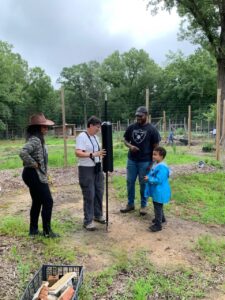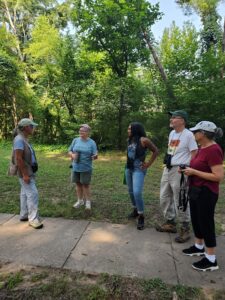New Committee Aims to Make Birding Accessible to More People.
Author: Jessica Belsky
Like so many others, Lynn Shapiro first discovered the joy of backyard birding when COVID-19 hit. She put up feeders and a bluebird box in her yard and began to learn the names and habits of the species that came to visit her. What birder among us can’t relate to the thrill of learning to identify new species for the first time? New Hope Audubon Society’s (NHAS) new Equity, Diversity and Inclusion (EDI) Committee wants to make sure that more people get to experience this joy.
While Lynn is new to NHAS, she isn’t new to nonprofit involvement. Several years ago she became active in local racial equity work. While doing this work, she met Marcia Mandel, chair of the new EDI Committee at NHAS. Marcia encouraged her to join and help form the roadmap for the Committee’s work. Lynn began working in EDI because it combined all the things she cared about. Marcia, who had also been involved in equity work for many years, felt the same way; so many things lie at the intersection of equity, diversity and inclusion.

Urban Community Agrinomics (UCAN) and New Hope Audubon Society (NHAS)
Kindra Holden (UCAN/NHAS), Marcia Mandel (NHAS), and LeShawn and Isaiah Edouard (UCAN) putting up feeders for UCAN at Catawba Trail Farm in Durham.
Equity refers to fairness and justice, and recognizing that we do not all start from the same place and we need to make adjustments to imbalances. The focus is on outcomes and root structures, and looking at how power is operating in an organization or system. Diversity is about who is present–all the identities and groups that are represented. Inclusion is about making sure that all can fully participate in decision making.
EDI isn’t something that only justice-focused groups work on—every organization can evaluate its programs, operations and outreach to examine whether it’s leaving people out.
“Our organization needs to reflect the diversity of our community…We need to be sure that what we’re doing is accessible to all people,” says Marcia.
The Committee was launched so that everyone can enjoy birding. Marcia began to consider what might keep someone from being able to participate, asking questions like:
- Do we only bird in places that you need a car to get to?
- Do we only have programs held during a typical workday?
- Are our birding sites accessible to someone who uses a wheelchair?
All of these considerations fall under equity, diversity and inclusion, because the aim is to involve everyone who wants to participate. If you’ve never considered the potential barriers to birding, you aren’t alone, and that’s exactly why the Committee is so important.
The Committee is connecting and collaborating with others working on conservation and climate change. There are many Black people, Indigenous people, and People of Color who have been active in these efforts for years. The environmental movement at large has not always incorporated and uplifted this work and NHAS seeks to change that locally. Getting there will require patience and a commitment to learning and understanding.
The Committee is just getting started with charting a course of action. But volunteers are already getting involved in training with local nonprofit partners that work on equity.
“I believe making spaces safe and comfortable for all people who want to enjoy birding is fair and just,” says Lynn.

Nan DeWire (NHAS), Annette Smith (Durham Parks and Recreation), Kindra Holden (UCAN/NHAS), Jim Capel (NHAS), and Lynn Shapiro (NHAS) assessing East Durham Park for birding outings.
A group of Committee volunteers is making visits to local birding locations to complete accessibility assessments for the birding site Birdability.org. Birdability lists birding sites with trails that are more accessible to those with physical challenges or health conditions and provides details about the sites. The plan is to incorporate these sites into NHAS birding outings so that more birders can safely and comfortably participate.
“Typically we go to more remote areas…hopefully we can find parks that are more accessible to people in wheelchairs, but also for people who may have transportation challenges getting to typical birding spots or who are more comfortable staying closer to their neighborhood,” says Marcia. “Birds are everywhere.”
“You start out getting interested in birds,” she says, “And then you get drawn in and engaged with the conservation work.”
And to reach that mission, we first need everyone to feel welcome and comfortable participating.

Kindra Holden (UCAN/NHAS), LeShawn and Isaiah Edouard (UCAN), and Nan DeWire (NHAS) putting up feeders for UCAN at Catawba Trail Farm in Durham.
Interested in getting involved? The committee is currently looking for more participants. Planned work includes: collaborating with Urban Community Agrinomics (stay tuned for a separate blog about that work), Birding 101 outings in Durham city parks, and reaching out to the local autism community. If you’d like to learn more or become involved, reach out to Marcia Mandel at marciamandel1@gmail.com.
« Back to All Press